In TCM, mental activities including emotions are referred as shen (spirit), which is closely correlated with the functional activities of internal organs. One's spiritual outlook reflects the general vitality of the human body.
As we grow older, deteriorations of internal organs lead to mental weakness, causing intellectual difficulty, poor memory, slow response rate, sadness, anxiety, mental fatigue, changes in sleeping or behavior patterns. These will be reflected in appearance too, rouge skin, dark circles, dull complexion, spots or other premature signs are always accompanied. This it is hard to cover up the skin problems with skin management or cosmetics simply. Mental health is essential to skin beauty, thus TCM highly recommends to manage both body and mind for anti-aging.
TCM holds that the
shen is housed in heart, and blood and qi (vital energy) are material basis for it to function. The blood and qi are sourced from the spleen, and the liver takes charge of regulating the
shen to work properly, in particular of emotional responses. As a result, mental aging is mostly associated with the heart, liver and spleen. TCM management of mental health is to assure the good condition of these three organs, including nourishing the heart, invigorating the spleen and soothing the liver.
1. Nourishing the heart to calm the mind
First of all, a right attitude to life and good living habits are important for a peaceful mind. Leisure activities such as hobbies, painting, traveling, making friends, listening to music, and reading are excellent to calmed down the mind, and these will greatly slow down the aging of
shen in the heart. See "
The Chinese Way of Mind Cultivation".
Aging along with heart deterioration, that is, when the heart fails to rule the spirit properly, mental activities become unstable. Individuals tend to appear mental fatigue, irritability, absentmindedness, insomnia, nightmares, poor memory, low spirit, excitability, panicky, a tendency to heart throb and nervous sweating. Ingredients benefit for calming the shen and replenishing blood are sour jujube seed, schisandra, red sage root, longan aril, Chinese senega (yuan zhi), dates, poria, lily blub, honey, milk, lotus seed and lotus root, which enhance the ability of the heart to rule the shen and minimize the mental aging problems.
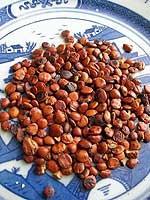 |
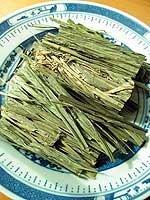 |
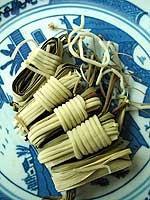 |
| Sour jujube seed |
Lophatherum herb
(dan zhu ye) |
Common rush |
In some cases, the heart becomes hyperactive and has accumulated excessive fire, leading to dizziness, excitability, irritability, confusion, mania, agitation, frenetic movement and delirium. Ingredients for clearing heart fire include lophatherum herb (
dan zhu ye), common rush, fresh rhemannia root, lotus seed cores, gardenia fruit, golden thread rhizome, white chrysanthemum, bitter melon, loofah, watermelon, mung beans and leaf mustard.
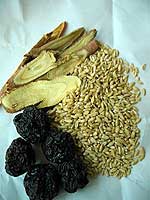
An adequate amount of sleep and massage of the head and foot regions are also good for calming the mind.
2. Invigorating the spleen to refresh the mind
In TCM, overuse of the brain is harmful to qi circulation, and will greatly exhaust the heart and spleen. When the brain is overused, the body tends to have stagnate qi flowing, blood stasis or accumulated excessive pathological wastes internally, making the affected individuals liable for various health risks from middle age onwards. Regular exercise is especially important for them, that can relieve mental stress, and promotes qi and blood flows. However, don't over exert the body, gentle exercises are more proper for strengthening muscles, promoting blood supply to the brain and refreshment.
For mental exhaustion, tonic remedies often contain herbs such as pilose asiabell root (
dang shen), poria, Chinese yam, largehead atractylodes root (
bai shu), lotus seeds, dates, longan aril, pumpkin seed and mushrooms. These ingredients are beneficial for mental workers who present with mental fatigue, palpitations, declined memory and insomnia. Other symptoms such as absentmindedness, difficulty in concentration, generalized heaviness, headache, chest oppression and irritability that may be due to
phlegm and
dampness accumulations. Common ingredients for resolving these problems are tangerine peel, pinellia tuber (
ban xia), poria, coix seed, hyacinth beans, radish, hawthorn fruit, bamboo shaving, fiveleaf gynostemma (
jiao gu lan) and Chinese yam.
Restore Spleen Decoction is a proper prescription for the exhausted individuals, who had signs like heart palpitations, forgetfulness, insomnia, night sweats, poor appetite, fatigue and sallowness.
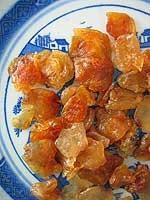 |
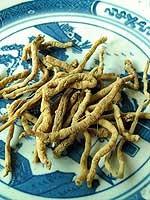 |
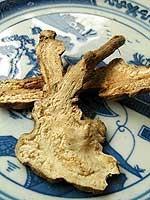 |
| Longan aril |
Chinese senega
(yuan zhi) |
Largehead atractylodes root
(bai shu) |
Individuals are also advised to have a balanced and easily digested diet, and reduce the amount of frozen and raw foods eaten.
3. Soothing the liver to relieve mental stress
Long-term emotional problems such as depression, impatience and anger are harmful to the brain and greatly contribute to premature aging. In TCM understanding, the liver plays an important role in regulating emotional responses and maintaining a stable internal environment. Normal mental health depends on the harmony of qi and blood. When the liver is effective in regulating the blood and qi flowing smoothly, a relaxed internal, emotional environment is created. Some of the health risks associated with emotional instability can be resolved by the following methods:
Promoting the liver's regulating ability
In TCM, emotional instability leads to a state of "liver qi stagnation", where the qi flow in the body is interrupted leading to physical disharmony and imbalance. TCM can relieve this by herbs like nutgrass, turmeric root-tuber, finger citron fruit, Chinese tororwax root, tangerine peel, rose, jasmine and white peony root, which can promote the liver's regulating ability and reduce physical damages caused by mental stress.
Nourishing liver blood
Insufficiency of liver blood causes dizziness, insomnia, irritability, and dream disturbed sleep. Other associated signs may be dry eyes, blurred vision, ear ringing, rib side discomfort, lusterless face, brittle nails, limbs numbness, tendon and muscle spasms and menstrual problems. TCM holds that "protracted watching injures the blood", therefore, the above conditions are more often seen in those who spend a long time reading. Common nourishing ingredients are angelica root, donkey-hide gelatin, fleece flower root, processed rhemannia rhizome, mulberry fruit, litchi aril, Chinese wolfberry, daylily and animal liver. The
Sore Jujube Seed Decoction is a well-known formula for irritability and insomnia in this situation.
Clearing liver fire
Liver fire usually results from a stressful and unhealthy lifestyle over a long time. In addition to emotional instability and irritability, the sufferer may also have insomnia, dizziness, ear ringing, bloodshot eyes, a flushed face, facial spots, constant thirst, a bitter taste in the mouth, indigestion, acne, constipation, yellowish urine and hypertension. Herbs used to treat these problems include Chinese gentian root (
long dan cao), gardenia fruit, baical skullcap root (
huang qin), virgate wormwood herb (
yin chen), selfheal fruit spike, chrysanthemum and white peony root. Chronic patients may occasionally have emotional irritability due to
virtual fire caused by
yin deficiency of the liver and kidney. Physicians will clear this kind of virtual fire by amur corktree bark (huang bo), anemarrhena rhizome (
zhi mu), sweet wormwood herb (
qing hao), soft turtle shell, peony root bark, oriental water-plantain root and celery.
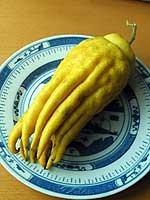 |
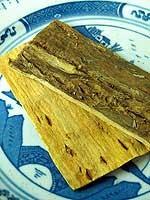 |
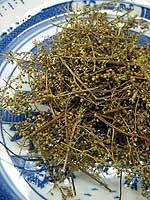 |
| Finger citron fruit |
Amur corktree bark
(huang bo) |
Sweet wormwood herb
(qing hao) |












